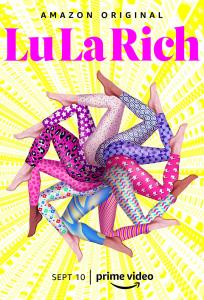
I don’t pay attention to the vast majority of ads, “stories”, livestreams, or announcements that go by on social media. One of the big takeaways from Amazon’s newest miniseries LuLaRich is that my aggressively ignoring most of that sort of thing is both healthy and wise. At the very least it is sound financially. But it also means that when the wife said she wanted to watch the documentary about “LuLaRoe” I assume it was about a kidnapped heiress or something like that, because I’d never heard of that particular kind of stretch pants. Or leggings. Or whatever they are–I’m not clear on all the terms here.
But apparently they were a big deal not all that long ago–particularly in the world of stay-at-home moms who want to contribute to the family income without having to get a full time job. (Possibly also in the world of those who have slightly too much time on their hands.) And frankly, all joking aside I still want to be a little bit careful in claiming that I now “know” about LuLaRoe, since literally everything I know about it comes from this documentary–and obviously the creators have their biases as well.
That said, it’s an excellent show and you should absolutely watch it. Over the course of four episodes, we see a company get off the ground, grow into a billion dollar business over the course of a year, and then… contract (since it’s still around, “collapse” isn’t quite the right word) into something much, well, lesser than it had been. The focus of the series is the charge that the growth was not so much the result of selling a quality product as it was the predatory luring of (mostly) women into investing in a pyramid scheme.
There are all sorts of takeaways from this show, several of which are even mentioned in the series itself. One is the potential market power of a specific demographic–namely stay-at-home moms. (A similar dynamic comes out of Mrs America in its focus on the political power of these women.) Another is the nature of start-ups and their impromptu structure and ad-hoc responses to new challenges as a result of surprising growth. Yet another is the point that LuLaRoe didn’t have to be the pyramid scheme it became. The first few ‘retailers’ the company recruited did quite well, making a small profit for themselves and a small profit for the company. Once it became a pyramid scheme that changed, and the company and a small number of retailers made a lot of money while no one else did. But that wasn’t a necessary transition. Had everyone been content with the modest success experienced in the early days of the company, this story might have had a radically different ending. There also might have been fewer corporate meetings featuring Katy Perry and Kelly Clarkson, but in retrospect that might have been a worthwhile trade. At one point they show a clip from a conference where retailers talk about how they’ve made eighteen thousand dollars in retail and three hundred thousand dollars in bonuses for signing up others. Obviously the focus was on the $300K, but that first number is worthwhile too: she made eighteen thousand dollars selling pants. That’s not nothing–heck, I’d considered selling something part-time for that. But instead they went for ‘growth’ and expansion with the results on display in the show.
From the religious side of things, there are also moments in the series when the Mormonism of the founders of the company is mentioned. I think at the end of the day the filmmakers didn’t really know what to do with it (and may or may not be aware of what Mormonism even is–we can’t all have grown up in Wyoming), so it was mentioned but not much more than that. I suspect it probably tied into the points made in the series about how the business tried to emphasize families all staying at home and working together, and how it tried to encourage the women to get their husbands involved. Which sounds weird for a business, but again: not my world, and not overly emphasized by the documentary.
And this is the point where someone who pays more attention to multi-level marketing than me could talk about the theology of stretch pants, or why there don’t seem to be any of these businesses for men (or are there? again, this isn’t my area), or why the best way to be involved in a pyramid scheme is right at the beginning when the bonuses are big but before they make you go to the big national conference.
In any case, this is a great series and certainly has much fodder for reflection for believers. I don’t know that we Christians are automatically more susceptible to pyramid schemes than others, but I know we’re not less susceptible to them. This needs to change, and being aware of the model, of how it catches on and trends in certain groups, and how it can abuse those who are unwary is important in helping us think carefully and well about our life and witness in the world.
Dr. Coyle Neal is co-host of the City of Man Podcast and an Associate Professor of Political Science at Southwest Baptist University in Bolivar, MO











